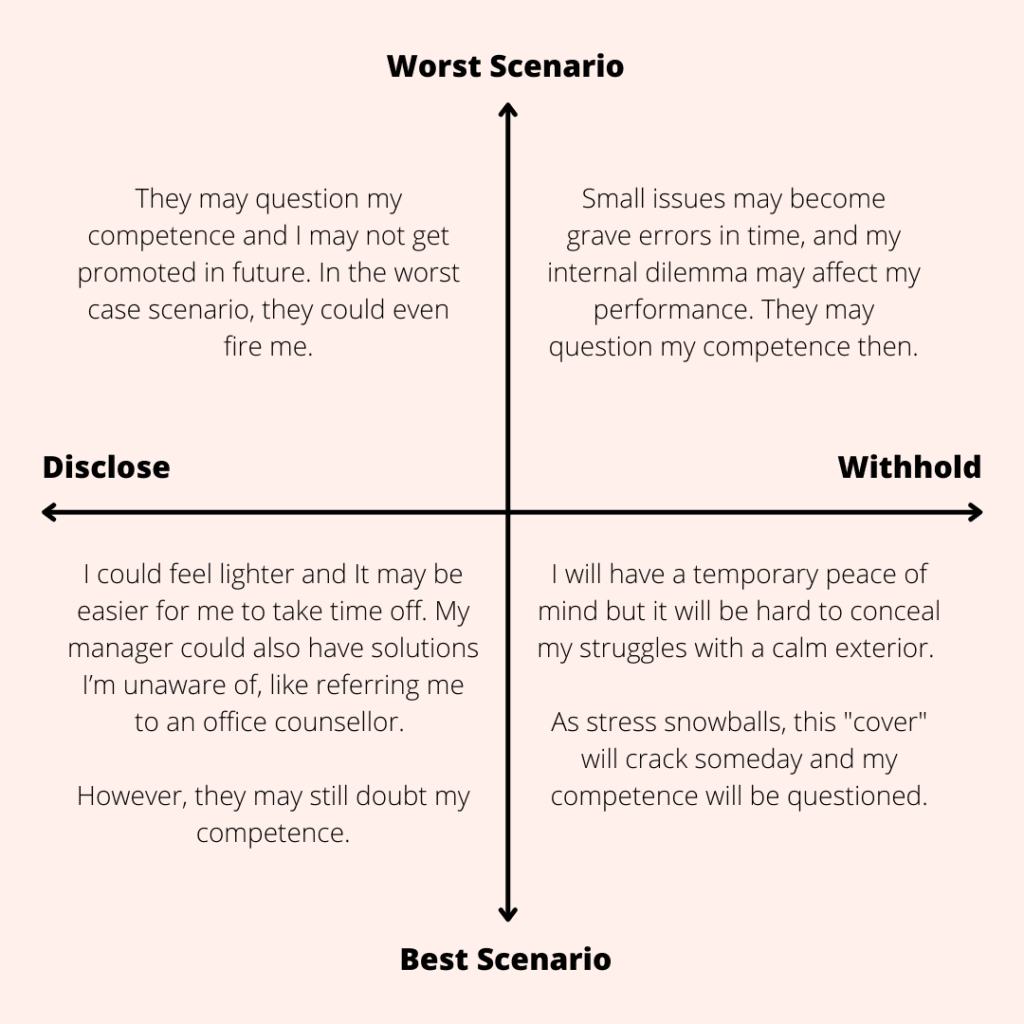“Just because no one else can heal you or do your inner work for you, does not mean you can, should or need to do it alone.” – Lisa Olivera
Many believe there is no point in sharing our mental health challenges with others at home and work because there’s only so much family and colleagues can do. Even though destigmatisation has been well-paced in recent years, workplaces have a long way to go in normalising such conversations.
As a life coach, and HR professional, I have seen executives who choose paid sessions with me over practitioners within their organisations who are available free of charge. Held back by the fear of jeopardising increments, promotions, reputation, and even job security in the event of downsizing, 82% of workers diagnosed with mental illnesses do not disclose them to their managers.
However, when mental disturbances go unaddressed, employees who work at a slower pace end up working longer hours and sleeping less. Which begs the question: at what cost should employees withhold their state of mental health?
Should you talk to your manager about your mental health?
Created by the French mathematician and philosopher Descartes, the Cartesian Quadrants is a technique I use with clients who have to make tough decisions independently.
This method elicits genuine responses and considers the implications of every possible decision from four angles. It tackles a pattern of self-sabotage by honing in on one simple question: what happens if I do this? As our minds get confused when holding too many viewpoints, writing is imperative in this exercise. You can try this alone, with a friend, or with a coach.
Below is an exercise on deciding between disclosing and withholding feelings of burnout, depression, and anxiety at work.

It is critical to acknowledge that a negative perception could be made in all cases. Despite that, should an employee conclude that it’s more logical to disclose than withhold, it is important to identify the best person in the organisation—whether it be the HR manager or their immediate supervisor—to handle this maturely. Depending on the employee’s comfort level, they can decide to have this conversation in a formal office setting or over a cup of coffee informally.
1. Set your intentions for the conversation
Set basic expectations before initiating a conversation. What do you hope to achieve from the sharing? Here are some possibilities:
- A better rapport and more trusting working relationship
- More flexibility and ease when taking days off
- Reduced workload
- Change of role, team, or function
- Additional support on time-consuming tasks
More importantly, what are the trade-offs you are willing to make for your desired outcome? Would you be okay to work fewer hours if it meant a temporary pay reduction? Help your manager or HR personnel help you by considering these outcomes ahead of time.
2. Decide how much “downtime” you need

In some cases, stress can be eased in a week or two. In others, employees who are burnt out may need to take a few months off work, and those with diagnosed mental health conditions may need long-term treatments. To avoid assumptions by the management and manage their expectations, communicate what you need clearly so they know how to follow up.
3. Create an entry point in the conversation
For employees who are nervous about broaching the topic of mental health with their supervisors, it might be a good idea to start with the company’s values or recent movements. This could sound like:
“Last month, the leadership team discussed the importance of transparency in our town hall. I have given some thought and, in the spirit of openness, would like to share some challenges I’ve been facing at work.”
“As you are a mentor to me, I would like to seek your advice on managing the ever-changing work arrangements lately. Frankly, I’m finding it difficult to adjust.”
When asked for advice, people are often willing to share and curious to know why they were chosen as confidantes. This gives employees an entry point to open up, though they should be mindful of boundaries in informal exchanges.
4. Explain the impact on your work

Opening up is cathartic and it can be tempting to go off on a tangent, but employees must remember to highlight how mental health struggles ultimately affect their performance at work. Are their struggles inhibiting them from engaging with team members? Or are they translating to lower productivity and quality of work?
Follow that up by asking about potential provisions and, based on deliberation in the first two steps, state your preferred outcome from the conversation.
5. Give your manager time to process
While the situation may feel urgent, employees should understand that their managers may not have dealt with such a conversation before. Even if their reaction is not ideal, respect their need for time and space to process your sharing before committing to an action plan. Be patient and check if there’s a better time to follow up with them.
How employers might respond
Contrary to the disastrous consequences employees imagine, employers will not resort to immediate and harsh action in most cases. Instead, they would look for alternatives.
A client I coached was offered a different role that no longer required them to face customers. It sounded like a compromise initially, but its benefits on the employee’s stress levels were remarkable. Temporary and permanent role switches may also be offered to help employees cope with mental health challenges without compromising their jobs. Some firms have introduced sabbatical leave policies for employees with diagnosed mental illnesses, while others refer them to internal counsellors. The appropriateness of a solution-focused approach depends on the company’s inclination, to begin with.
At an organisational level, managers and HR personnel should also be trained to handle mental health conversations sensitively by listening actively without judgement. At the end of the day, only with a mutual effort from employers and employees can this endeavour succeed.






